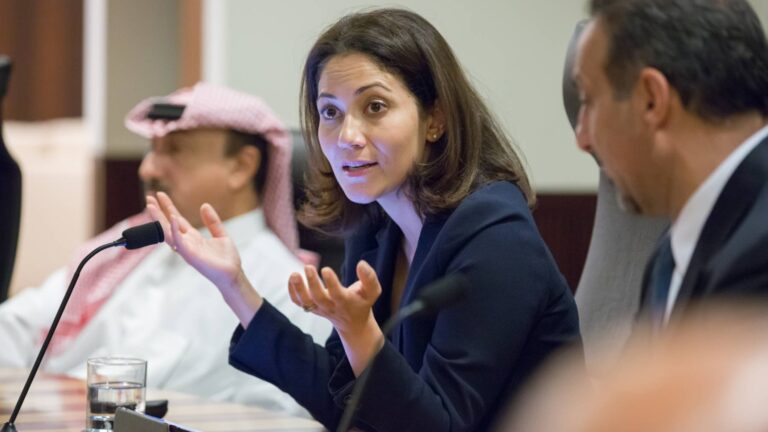Dialogue Series, Distingushed Lectures, Regional Studies
Mishal Husain on "News and Views in a Post-Truth World"

Mishal Husain, one of the BBC’s best-known presenters, delivered a CIRS Focused Discussion on “News and Views in a Post-Truth World” on November 30, 2016. Her talk gave insights into how journalists navigate through, and respond to, ever-changing news environments, particularly during seismic world events such as the Arab uprisings and the recent spectacle of the US presidential election. Relaying her journalism experience, spanning over two decades in the field, she said: “I am aware, and feel the privilege of the job I do, not just the places I go to, but the moments in time and, certainly, the access to both the powerful and the powerless.”
Husain reflected on how the UK’s recent EU referendum was reported, highlighting the duty of the BBC and other broadcasters to ensure due impartiality in political coverage, the controversy about “fake news” in the wake of Donald Trump’s election victory, and her concerns about hearing “mainstream media” employed as a term of abuse.
Many people have become progressively dismissive of traditional, established news channels that reach a mass audience, and there is a growing environment in which people are seeking to reinforce their own views, rather than opening up to a culture of informed debate. “The debate about fake news is very compelling at the moment, but the influence of stories that are misleading at best will also require careful scrutiny.” Ultimately, she noted, all this is leading to the increasing circulation of misinformation, the dismissal of facts, and the erosion of truth.
In conclusion, she argued that there is a personal responsibility for people to examine the facts and to weigh the evidence. “I am deeply concerned today about the echo chamber, but also what I see as the lack of a critical thinking mindset, which is now even being identified as a bulwark against radicalization.” Husain stated. She talked about the importance of a wide range of news sources, particularly for minority communities, and an openness to explore other opinions and perspectives. “Our capacity for citizenship will not improve unless these personal skills are developed.”
Mishal Husain appears on the influential Today programme on BBC Radio 4 and presenting the main Sunday evening news on BBC1. She also presents on location from around the world, including Pakistan after the killing of Osama Bin Laden and the Peshawar school massacre, and the Middle East through the Arab uprisings and the Syrian refugee crisis. For many years she was one of the main presenters on the international channel BBC World News, and while based in Washington between 2003 and 2004, her nightly news broadcasts developed a keen following among American viewers on PBS. She was also based in the BBC’s Singapore bureau for a time, presenting business news programmes, and her sustained focus on Asia took her to the Beijing Olympics in 2008 and the Shanghai Expo in 2010. Mishal has presented four critically acclaimed BBC documentaries: Malala—Shot for Going to School, and How Facebook Changed the World on social media and the Arab uprisings, and a three-part series on the life of Mahatma Gandhi. In 2016, her hour-long film Britain & Europe: The Immigration Question was screened days before Britain’s landmark EU referendum vote. In January 2016, she was named by the Sunday Times as one of the 500 most influential people in Britain, and in 2015 she won the London Press Club’s Broadcaster of the Year award and was the Women in Film and TV Awards Presenter of the Year. In 2013, she was one of the Financial Times’ Women of the Year and in 2009 the Times named her as one of the top five most influential Muslim women in Britain.
Article by Suzi Mirgani, Manager and Editor for CIRS Publications.